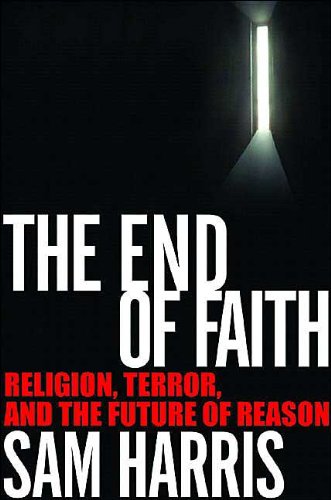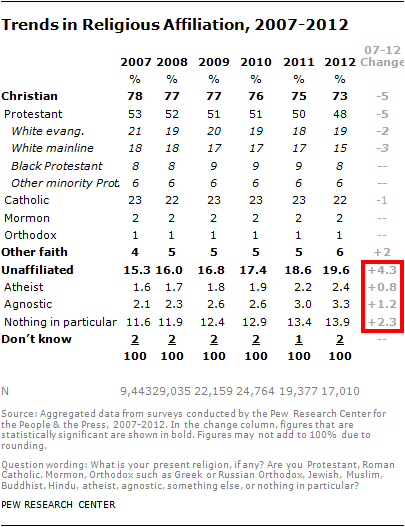In was ten years ago today that Sam Harris‘ The End of Faith was published, beginning a three-year boom in atheist publishing that saw the releases of Daniel Dennett‘s Breaking the Spell, Richard Dawkins‘ The God Delusion, Ayaan Hirsi Ali‘s Infidel, and Christopher Hitchens‘ God is Not Great.

Those books not only caused their subject to go mainstream in a way it never had, their authors became the standard-bearers for atheism in America. Gary Wolf, in a Wired magazine cover story, dubbed the male authors the “New Atheists” and summarized their unstated goals: “They condemn not just belief in God but respect for belief in God. Religion is not only wrong; it’s evil.”
In the years to follow, we saw a demographic shift take place as well. The Secular Student Alliance saw a dramatic increase in college and high school atheist groups:

A Harris Poll also found that Americans’ belief in God dropped from 82% in 2005 to 74% in 2013. The Pew Research Center similarly reported slow but steady growth for the religiously “Unaffiliated” between 2007-2012:

How much of that is attributed to the books? No one can say for sure, but it’s hard to understate their impact on the public discourse surrounding religion.
I recently asked Sam Harris to reflect on his own contribution to that discourse. What impact did his book have? Why were books about atheism such a phenomenon in the years to follow? What lies ahead for atheists?
This is what he told me (via email):
That’s a difficult question to answer. I certainly see the impact that The End of Faith had on publishing — as you indicated, the book initiated the “new atheist” run of bestsellers. But I don’t know what effect these books have had on the wider culture. The poll numbers seem to be inching in our direction — with the percentage of Americans claiming “no affiliation” with religion, or even declaring their “atheism” outright, slowly growing. But whether or not my book had anything to do with this trend, I don’t know. I can say that I’ve heard from tens of thousands of readers personally, and many of them have said that I changed their views about God, faith, etc. But there may be just as many people I haven’t heard from whose faith was redoubled by my failure to address the finer points of “sophisticated” theology.
As you know, I’m not a big fan of rallying around the concept of “atheism” — for reasons that I once spelled out in a talk entitled “The Problem With Atheism.” In fact, I never even used the term “atheism” in The End of Faith, simply because it never occurred to me to use it. I agree that it serves a narrow political purpose, and [can] sometimes be useful, but it comes with a host of liabilities. I prefer to talk about the conflict between faith and reason, religion and science, bad evidence vs. good evidence, etc. One very dangerous blind spot engendered by generic “atheism” is a default assumption that all religions are the equally bad and should be condemned in the same terms. This is not only foolish, it’s increasingly dangerous. Anyone who is just as concerned about the Anglican Communion as he is about ISIS, al-Qaeda, and rest of the jihadist menace needs to have his head examined.
The future of “atheism” — one in which our hopes for a truly secular and rational world are fulfilled — is one in which we keep important distinctions in focus. Above all, it is a future in which we remain free to criticize bad ideas, and are moved to criticize them in proportion to how much harm they are doing in our world.
By the way, you can see a full transcript of Harris’ talk about “The Problem with Atheism” right here.
Let me add two thoughts to what Harris said. The first throws some cold water on how much progress we’ve made. The second considers what we have to look forward to.
While pastors and pundits alike have bemoaned the decline of religion in our country, it should be noted that the largest ever gathering of atheists in America, at the 2012 Reason Rally in Washington, D.C., only brought together an estimated 20,000 people. Pastor Rick Warren‘s Saddleback Church brings in that many people on an average weekend. As much as we may have grown, we still remain mostly unorganized and ineffective.
That said, I suspect the percentage of Americans who are openly atheistic will continue to grow as more people are exposed to the books, blogs, podcasts, and YouTube videos that have hastened the spread of pro-atheist arguments in the past several years. What I’m especially looking forward to are discussions that go beyond whether or not God exists. It’s much more interesting to talk about practical ways to use our atheism. In other words, it’s time to ask, “What now?”
Consider these questions that have come up in more recent books and online conversations, questions that the New Atheists never focused on in their bestsellers — couldn’t focus on, really — because they were still talking about the broader concepts of God and religion:
Relationships
- Is it possible for an atheist to date a believer and make it work?
- At what point in a relationship should you bring up your non-belief?
- How should you deal with religious relatives?
Raising families
- Can a couple raise their children without religion?
- Are there secular substitutions for rites of passage like baptisms, First Communions, and Bar/Bat Mitzvahs?
- Should you raise your children to be non-religious or is that just another form of indoctrination?
Politics
- Is it possible for a candidate’s atheism to not be seen as a liability?
- Can atheists ever become a voting bloc that’s as reliable for liberal candidates as the Religious Right has been for conservatives?
- When will Democrats begin paying special attention to us?
Humanity
- What’s the best method for atheists to give to charity?
- Do atheists need communities in the same way Christians need churches?
- How can organized atheism become more appealing to women and people of color?
Handling differences of opinion
- Is there a place in the broader atheist community for Republicans?
- How accepting are we to atheists who may be pro-life for secular reasons?
- What resources are available to atheists who choose to homeschool their children?
…
In many ways, atheists, only united by what we don’t believe in, may be even more tight knit and monolithic in our thinking than Christians, who are united by the Bible and their belief in the divinity of Jesus. We’re struggling with the problems many groups encounter as their movements expand and become more diverse. You would think it would be easier for us to embrace those who think differently because there’s no document we can point to and say, “This is what we all must believe.” But in practice, that hasn’t been the case at all.
I think that has to be what we focus on now: How to grow the tent and move beyond just arguing over God.
Harris’ latest book, Waking Up (which comes out next month), is taking that very step by exploring the concept of spirituality without religion. There’s no way the book could’ve been written ten years ago, but thanks to the movement he helped create, it’s a subject worth talking about.
***Update***: Daniel Dennett has also weighed in on the impact of Harris’ book (via email):
I read Sam Harris’s The End of Faith while I was working on Breaking the Spell. One passage particularly [stood out]:
“If our tribalism is ever to give way to an extended moral identity, our religious beliefs can no longer be sheltered from the tides of genuine inquiry and genuine criticism. It is time we realized that to presume knowledge where one has only pious hope is a species of evil. Wherever conviction grows in inverse proportion to its justification, we have lost the very basis of human cooperation.” [p. 227]
This harmonized perfectly with my own sense of the need for atheists to speak out candidly about the double standard — the diplomatic spell — that should be broken. It was very good to know that I would have such an articulate and well-informed ally, and when I subsequently met him, I was delighted to discover what an engaging and quick-witted interlocutor he is. We don’t agree about everything, but even where we don’t see eye to eye, I learn important things from him.



It’s Moving Day for the Friendly ..."
It’s Moving Day for the Friendly ..."
It’s Moving Day for the Friendly ..."
It’s Moving Day for the Friendly ..."